

THE
NEWS IN BRIEF
NAME CHANGE
The Vascular Disease Domain has been renamed to the Aortic Disease Domain. The change reflects the recommendations of the EACTS/STS 2024 Management of Aortic Disease Guidelines which state the aorta should be viewed, interpreted and treated in the context of an organ.
Learn more about the Aortic Disease Domain

EACTS COUNCIL NOMINATIONS NOW OPEN!
Are you ready to shape the future of cardiothoracic surgery?
EACTS is seeking passionate, experienced members to step into key leadership roles and help drive innovation across our global community. Nominations are now open for the following positions on the EACTS Council:
• Vice President
• Secretary General
• Aortic Disease Domain Chair-Elect
To nominate a colleague, email a letter of nomination and the nominee’s CV to nominations@eacts.co.uk by 2 August 2025.
Both the nominator and the nominee must be current EACTS members.

A VALUABLE RESOURCE FOR BENCHMARKING AND RESEARCH
We are delighted to welcome more and more contributors to the EACTS
Adult Cardiac Database
(ACD).
Cardiac data relating to 20,000 procedures have now been uploaded to the database, helping to advance the field of cardiothoracic surgery by enabling comparative data analysis and the sharing of best practice.
Hospitals in Ireland, UK, Germany, Estonia, Spain, Bulgaria Ireland, Belgium and The Netherlands are represented in the database with more than 20 centres having signed agreements with EACTS to contribute in the initiative. Erasmus University Medical Centre, La Paz University Hospital and The National Cardiology Hospital are among the latest centres to join.
Paola Quattroni, Quality Improvement Director at EACTS, said: “With the ACD, we aim to drive standardisation of data collection across the world, improve data quality and foster research in quality improvement. The ACD is not just a database, it is an opportunity for surgeons and decision makers to come together and better understand surgery, improve their clinical practice and achieve better outcomes for their patients.”
Sign up to the ACD
Hospitals and national registries are encouraged to sign up to the ACD. The first step is to sign the Founding Charter before mapping the hospital’s data to a standardised data dictionary ready to upload. Edgar Daeter, Chair of the QUIP Committee, said: “This process is now much simpler and faster for national registries, hospitals and surgeons following changes to the database’s code. The QUIP team also provides support with data mapping and uploading to the ACD.”
Analysing trends and outcomes
The ACD is a collaborative registry and benchmarking tool of anonymised cardiac surgical data for centres across Europe. Use of this data allows surgeons to better understand clinical practice in their hospitals and inform best practice and research that will help drive quality improvements in cardiothoracic surgery.

The tools and interactive viewer enable users to analyse trends and outcomes over time and against patient characteristics as well draw international comparisons. Different types of interventions and outcomes can be filtered, making it easier to derive valuable insights. The database will be a source for key scientific research questions.
Hospitals that contribute data to the ACD can also enjoy additional benefits including free access to the ACD and the option to download bespoke reports with analyses of your hospital data. Participating hospitals become part of a community of practice, with an opportunity to have a say on data standards and best practice. Feedback from participating centres is critical to ensure the database remains fit for purpose and serves the needs of users.
We continue to work with hospitals across Europe and beyond to increase the diversity and richness of datasets, and are working closely with European national societies and national registries to further collaborate and enrich the ACD.
The ACD will soon be freely available to EACTS members to view aggregated-level data and trends. This is one of the key benefits of EACTS membership.
Participate in the Adult Cardiac Database
We are privileged to be part of this wonderful initiative and to have contributed to this important database. Data sharing in healthcare has numerous benefits, significantly enhancing patient care, research and the overall efficiency of health systems.
Dimitar Kyuchukov, Head of Department
The National Cardiology Hospital, Sofia, Bulgaria
A new Programme Manager
The Quality Improvement Programme Team recently welcomed Elaine Brannigan, who joined as Programme Manager to support the day-to-day activities of the programme.
THE 3RD EACTS INNOVATION SUMMIT

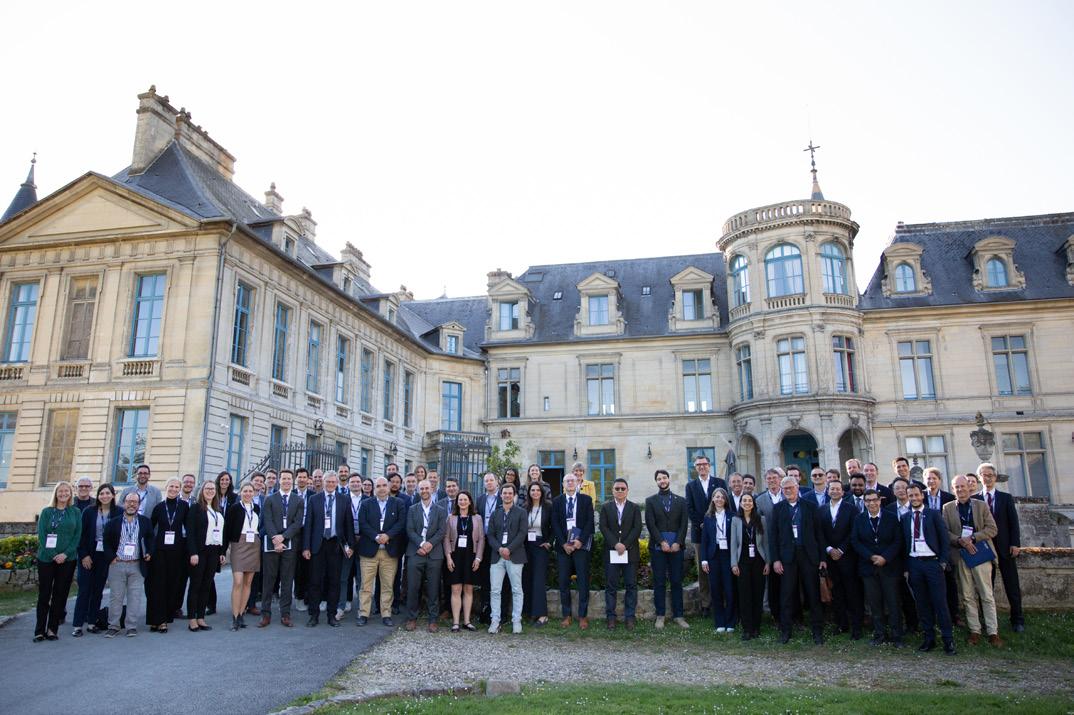
Leading names from across different scientific fields came together in April to share knowledge and science that will drive new disruptive ideas and approaches in cardiothoracic surgery.
Attended by engineers, scientists, surgeons, cardiologists and industry leaders from around the world, the 3rd EACTS Innovation Summit highlighted the latest advancements and research taking place across many scientific fields from molecular hydrogen treatment and adventitial lymphatics to digital twins.
The two-day meeting featured high profile presenters including Karl Jakobs, Chair of CERN, who discussed fundamental research in particle physics at CERN and applications in medicine, and Björn Schuller, Professor of Artificial Intelligence
at Imperial College London who explored challenges, breakthroughs and the boundless potential of Artificial Intelligence (AI) in medicine and surgery.
Over 70 abstracts were submitted for consideration, demonstrating the strength of innovative thinking across the cardiothoracic community. Seventeen abstracts were selected for presentation at the Summit.
Friedhelm Beyersdorf, Chair of the EACTS Innovation Committee, said: “As cardiothoracic surgeons, we are always looking for better treatments for our patients. The Innovation Summit creates an environment where everybody recognises the importance of innovation and the fantastic potential to revolutionise cardiothoracic surgery and provides a forum to discuss the practical steps to advance these ideas.”
View the Innovation Report 2025
PRESENTING INNOVATIVE APPROACHES TO CARDIOTHORACIC SURGICAL TREATMENTS
The four recipients of the EACTS Innovation Grants presented their work during this year’s Summit. Each grant recipient receives €25,000 and will benefit from advisory collaboration with the EACTS Innovation Committee Advisory Board.
THE 2025 GRANT AWARD WINNERS
A novel total artificial heart
Daniel Zimpfer, Marcus Grannegger and Krishnaraj Narayanaswamy Department of Cardiac and Thoracic Aortic Surgery, Medical University of Vienna, Austria
We are working on something that is very exciting – a novel artificial heart which combines two different existing technologies. Known as the ShuttlePump, it works in a pulsating manner with only one moving piston, which operates without contact, and does not require any valves. This allows it to support both the body and lung circulation simultaneously.
What really sets this apart from other devices that are already on the market is that it combines the durability of a rotary blood pump together with physiologic blood flow and low blood trauma. We believe this innovation could really change the field of total artificial hearts.
What is the potential impact of your research on surgical practice?
Currently, there is an unmet need for a total artificial heart (TAH) as a solution for patients with biventricular failure, cardiac tumours, congenital heart disease or univentricular
physiology. Most of the devices that we have are somewhat limited. This device really is designed as a long term total artificial heart - it could potentially have a revolutionary impact on the field of heart failure surgery.
What does winning an EACTS Innovation Grant mean to you?
It’s a huge honour for the team and their dedication to developing this device over the past four years. At the same time, and this is also very important, the money that we get creates a lot of momentum, and we will be able to validate everything that we simulated in bench testing and prototyping. The grant is a huge catalytic process for the entire project.
I think that we are working on something that is very exciting – a novel artificial heart which combines two different existing technologies.
AI-enhanced virtual reality training
Edris Mahtab
Cardiothoracic Surgeon & Associate Professor, Leiden University Medical Center, The Netherlands
Our project focuses on the benefits of AI-driven VR simulators to train personnel in extracorporeal membrane oxygenation (ECMO).
A VR ECMO simulator allows healthcare professionals from surgeons to allied health professionals to practice extracorporeal membrane oxygenation procedures in a safe and realistic environment. These simulators use VR technology to replicate the ECMO setup, patient conditions and procedures, providing trainees with immersive hands-on experience without the risks associated with real-world ECMO procedures.
What is the potential impact of your research on surgical practice?
Currently, there is a huge staff shortage not only in Europe but also in the United States, which is having an impact on our daily practice. Using our simulators to train the allied health professionals and residents prepares them for the clinical work and also facilitates patient care, for example, supporting clinical decision making. I think our simulators will have a huge impact on training, but also on patient care.
What does winning an EACTS Innovation Grant mean to you?
I would like to thank the Innovation Committee for this opportunity. The innovation grant has two benefits. The first one is the opportunity to finance co-workers and our project. Another very important benefit is that the grant gives some kind of recognition for this work and provides motivation to develop technologies that we actually don't use in daily practice.
Monitoring the unseen
Tommi Pätilä
Evalution of mechanical support and lymphatic dysfunction in a Fontan sheep model
Joeri Van Puyvelde, Piet Claus, Elizabeth Jones, Ruth Heying, Sarah Thomis, Bart Meyns Universitair Ziekenhuis Leuven
Our research is focused on the development of a two-stage Fontan sheep model and using this model to investigate the progressive lymphatic changes in the Fontan circulation. We plan to use this animal model to test a mechanical assist device in the Fontan circulation and see how this also impacts the lymphatic dysfunction that occurs.
What is the potential impact of your research on surgical practice?
Our research has several applications. It will be interesting to see how this lymphatic dysfunction occurs in Fontan patients because then, using the imaging techniques we develop in the Fontan model, we can use them in clinics. We will also hopefully be able to use the imaging techniques that we use in the animal model to find early changes in the animal’s lymphatic system. And then use the same imaging techniques in patients to catch Fontan failure at an early age.
What does winning an EACTS Innovation Grant mean to you?
The grant is crucial to starting our research, bringing the concept of cavopulmonary assist devices (CPADs) from the concept to the animal. The Fontan population is a relatively small but very vulnerable patient population, and they are often overlooked in larger research opportunities. The grant also gives us the opportunity to attend the Innovation Summit, which brings us into contact with other researchers, clinicians and possibly even industry partners to take our research to the next level.
Associate Professor, Consultant in Paediatric Heart Surgery and Organ Transplantation at HUS, Helsinki; Co-founder of SpectroCor
What sets your research apart from the existing solutions or approaches out there?
We’ve developed a novel optical sensor that enables real-time monitoring of myocardial oxygenation during open-heart surgery. The idea for SpectroCor’s in-tissue spectrometry technology was born from a tragic case involving a 30-year-old mother of two, who experienced a total loss of heart function due to undetected myocardial damage. This highlighted a major gap in current surgical monitoring tools. Today, heart protection during surgery relies on indirect indicators. Our device provides direct, tissue-level data on oxygenation, which can help surgeons make immediate, informed
decisions. It improves patient safety, gives surgeons greater confidence, and can ultimately reduce time in intensive care and save public healthcare resources.
What does winning an EACTS Innovation Grant mean to you?
It means a great deal. Being recognised by EACTS is both an honour and a powerful validation of our work. We’ve dedicated years to developing this technology, and the grant not only supports the next phase of the project but also affirms the potential impact of our innovation. We’re excited to bring this forward for the benefit of patients, surgeons, and healthcare systems alike.
DELIVERING MEANINGFUL CHANGE
Emily Farkas is a member of the EACTS Outreach Committee. In addition to her role as Associate Professor at Indiana University, she is Associate Director of Global Health in Surgery and President of the Cardiac Surgery Intersociety Alliance (CSIA), a transcontinental umbrella organisation of all the major cardiothoracic surgical societies, including EACTS. CSIA works to promote sustainable access to cardiac care in low and middle income countries, leveraging the strength of our professional societies.
Drawing on her own experience of supporting global educational and humanitarian programmes, Emily discusses the factors that are critical to success.
Globally, there are many cardiothoracic surgeons who do not have access to important resources – both physical and intangible resources such as education. Their programmes often have a great foundation but need additional uplift to advance to that next level and move toward sustainability for their own communities. A collaborative approach is key; working closely with local teams on skill transfer to empower their programmes. That’s the real magic.
The aim of the EACTS Outreach Programme is to coordinate and support sustainable and high impact projects that have longevity and will achieve meaningful change. With funding from the Edwards Lifesciences Foundation and the Every Heartbeat Matters (EHM) initiative, the Outreach Programme will distribute grants to projects that are focused on building a curriculum and a systematic pathway to independence as well as able to demonstrate the potential for sustainability.
Buy-in from local stakeholders such as Governments, the Ministry of Health and from the local administration is also critical to maintain the momentum of a project.
A profound contribution
Paying it forward can change your perspective personally and professionally. It’s always a bidirectional exchange of learning and collegiality that can frame some of the most rewarding parts of a career in medicine. Being involved in collaborative global work helps move the needle toward improved access to care and capacity-building in lower resource countries. That’s a profound contribution and a real privilege.
Globally, there are many cardiothoracic surgeons who do not have access to important resources – both physical and intangible resources such as education.
The first recipients of the EACTS Outreach Programme grants will be announced shortly.
2025
DESIGNING THE FUTURE
INNOVATE, DISCOVER, EDUCATE
DESIGNING THE FUTURE
October 2025 • Copenhagen, Denmark
INNOVATE, DISCOVER, EDUCATE
A PACKED PROGRAMME OF SCIENCE AND DISCOVERY
The countdown is on for the 39th EACTS Annual Meeting. There are just four months to go until the global cardiothoracic community comes together for four days of innovation, discovery and education.
With over 200 abstract, focus and plenary sessions to choose from, it’s never too early to start planning. As well as the latest in cardiothoracic science, our high-quality scientific programme includes hands-on training opportunities under the guidance of global experts.
The EACTS Annual Meeting opens on Wednesday 8 October with Techno-College. With its unique format of live surgery and live-in-a-box cases, Techno-College previews the technologies and innovative techniques that will impact daily practice in the future. Two programme streams - cardiovascular and thoracic surgery – are available for a separate fee.

Advancements featured at this year’s Techno-College include a new surgical cryoblation system and frozen Elephant Trunk with a new supra-aortic anastomotic device. The thoracic stream explores digital innovations in thoracic surgery and the use of artificial intelligence (AI).
Take a look at the scientific programme
Our domains, committees and task forces are dedicated to bringing delegates the very best research and science. Here are a selection of their focus session highlights:
Aortic Disease Domain

Chair: Florian Schoenhoff
Thoracoabdominal aortic surgery at the crossroads –Following advances in open and endovascular surgery, this EACTS/STS session explores contemporary strategies to treat this difficult patient population.
Type A IMH: a treacherous snake – This EACTS/ASCVTS session will discuss the optimal treatment of type A intramural hematoma, which is still a matter of debate, and consider which patients benefit from immediate surgery and for which patients watchful-waiting is an option.
Graft infection: the aortic surgeon’s nightmare – As we perform more and more complex aortic operations, we also implant more and more devices and prosthesis in our patients. This session deals with the difficulties of how to best intervene when these patients present with aortic graft infection.
Thoracic Disease Domain

Chair: Korkut Bostanci
Role of surgery in the era of perioperative immunooncology – This focus session will explore advancements in the treatment landscape of resectable non-small cell lung cancer in the era of immunotherapy.
Acquired Cardiac Disease Domain

Chair: Filip Casselman
Rethinking strategy, technology and outcomes in coronary surgery – This focus session will evaluate the evolving role of functional and imaging-based diagnostics in guiding coronary revascularisation, including the limitations of FFR for CABG and the potential of next-generation CT angiography and discuss best practice in conduit selection, surgical technique and postoperative medical management to optimise long-term outcomes for CABG patients.
Expanding indications for TAVI: bicuspid valves and aortic valve regurgitation – A session that will provide surgeons with the contemporary knowledge needed to inform collective decision making within the heart team, including red flags in TAVI imaging.
Specific situation in the Ross procedure: Application of principles and techniques for complex reconstructive surgery in endocarditis – Gain knowledge of interventional treatment options for valvular heart disease and the application of principles and techniques for complex reconstructive surgery in endocarditis.
Robotic surgery: Tools and capacity – Join Marion Durand and Franca Melfi to explore the current and future trends of robotic tool integration in a European thoracic department. Lost in space - Mesothelioma beyond MARS – Understand the changes from the 9th TNM and the impact on real world practice of the MARS2 trial in this focus session.
Congenital Heart Disease Domain

Chair: Juergen Hoerer
AATS/EACTS Joint Session: Aortic Stenosis in Children
– This focus session is an opportunity to understand the possibilities for the treatment of stenotic aortic valves in children and learn about the results after different repair and replacement techniques.
Precision in Practice: Emerging Imaging and Diagnostic Tools in Congenital Heart Disease – Gain a comprehensive understanding of advanced imaging techniques and their applications in congenital and adult congenital heart disease, enhancing diagnostic accuracy, surgical planning and treatment outcomes in complex conditions.
The Right Link: Advances in The RV to PA Conduits and Reconstruction – The different techniques and implants for reconstruction of the right ventricle to pulmonary artery connection will be explored in this focus session.
ABSTRACT OPPORTUNITIES
Submissions for late breaking abstracts are open!
Our popular Late Breaking Trials focus sessions offer a valuable opportunity for delegates to learn more about the latest trials that could impact clinical practice and guidelines in the future. Late breaking trials are typically first-time, international presentations of the primary endpoint or important secondary endpoint results of prospective multi-centre, randomised trials.
Abstracts could also present large-scale, high impact single-centre or multi-centre registries, first-in-man experiences with novel devices or drugs, or important follow-up data from major randomised trials. Learn more
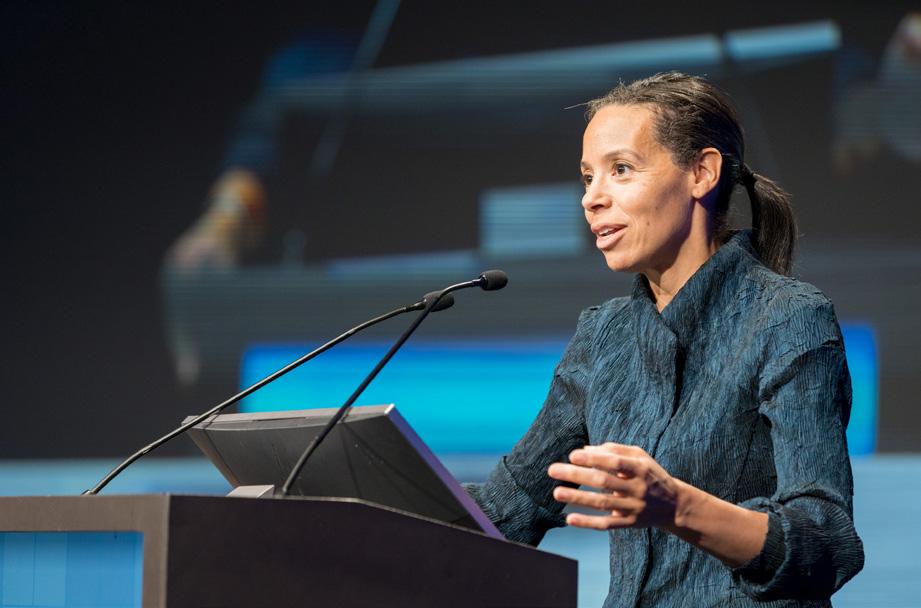
Pre-trainees and Allied Health Professionals
Abstract submissions are still open for pre-trainees and allied health professionals to feature in this year’s scientific programme.
Pre-trainee and allied health abstract submissions are open until 31 July 2025.
Learn more and submit your abstract
REGISTER TODAY
EACTS/AATS Foundation Academic Excellence Award
Distributed on a yearly basis at annual meetings of affiliate organisations around the world, the EACTS/AATS Foundation Academic Excellence Award provides a formal award of academic/scientific excellence for either an abstract or poster presentation.
EACTS/AATS Foundation Academic Excellence Award submissions are open until 31 July 2025.
Learn more
Registration is open! Your registration fee includes access to all scientific sessions Thursday-Saturday and entrance to the exhibition Thursday-Saturday as well as access to the TV Studio and Video-on-Demand. Techno-College has a separate fee and will allow access on Wednesday only.
Click here to register
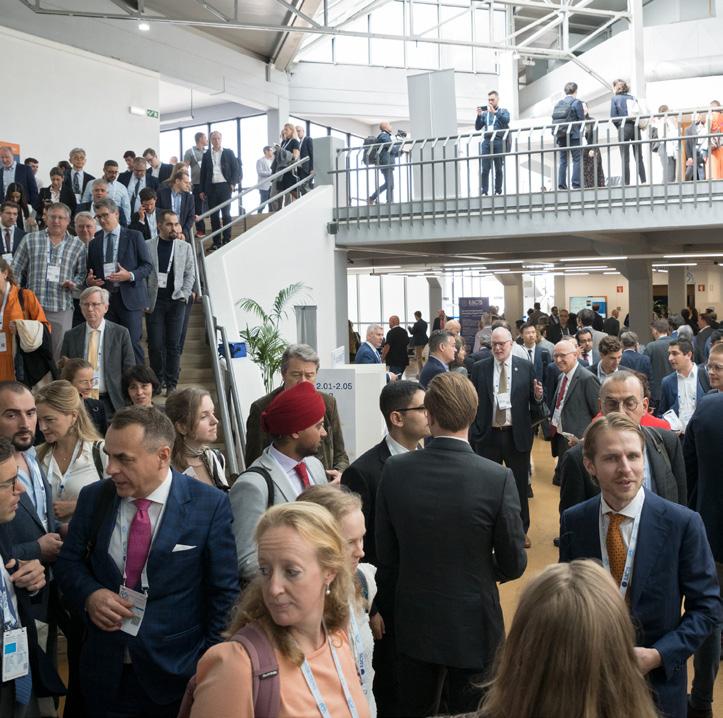
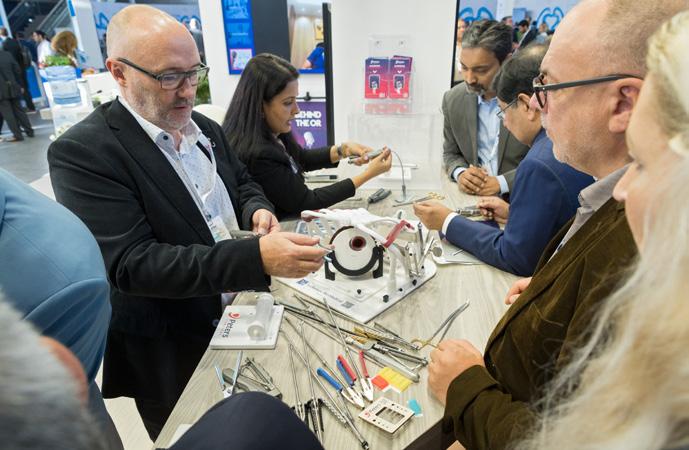
Partner with us at the 39th EACTS Annual Meeting
From our popular exhibition to hands-on workshops, we are delighted to offer you a range of opportunities to showcase your latest products and services. There are many different ways to get your company noticed at this year’s Annual Meeting with opportunities to advertise
on the EACTS app, in our official publication Daily News and on EACTS TV, our dedicated TV channel, which received over 20,000 total views in 2024. Availability is limited. Find out more or get in touch at industry@eacts.co.uk
GLOBAL COLLABORATION
Collaborating with other international societies is an important part of EACTS’ work, helping to fulfil our mission of better skills, better surgery and better outcomes. As a major international society, we value these partnerships which provide opportunities to share expertise and skills, hear new perspectives and be part of discussions that help shape the future of cardiothoracic surgery.

The 33rd Annual Meeting of the Asian Society for Cardiovascular and Thoracic Surgery (ASCVTS) took place in vibrant Singapore in May. EACTS held a series of successful joint workshops with STS, featuring stimulating debates and panel discussions on topics including CABG, Aortic Valve with a focus on Aortic Stenosis and Aortic Valve – Aortic Regurgitation.
In addition, a joint session with ASCVTS explored enhancing cooperation between Asia and Europe in thoracic surgery, highlighting the work of EACTS’ thoracic domain and, through the Francis Fontan Fund, Europe’s commitment to training young thoracic surgeons.
The STS/EACTS President’s Award was also presented to the most outstanding scientific abstract at the ASCVTS Annual Meeting, selected for its innovation, scientific rigour, and potential impact on the field of cardiothoracic surgery.
Learn more

AATS SEATTLE
The American Association of Thoracic Surgery (AATS) held its 105th Annual Meeting in Seattle in May, with an AATS/EACTS joint session part of the scientific programme in the scientific programme. The session, featuring EACTS Vice-President, Rafa Sádaba, explored guidelines, big data and clinical trials.
Learn more
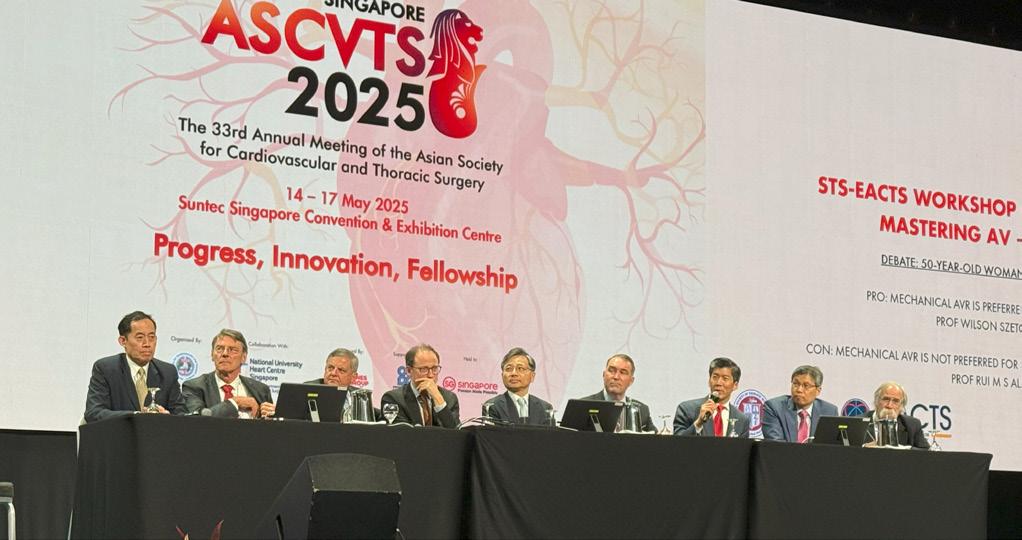
2025 STS/ EACTS/ESTS LATIN AMERICA THORACIC SURGERY CONFERENCE

Members of the Thoracic Disease Domain proudly represented EACTS at the 2025 STS/EACTS/ESTS Latin America Thoracic Surgery Conference, a full-day symposium in association with TÓRAX 2025 –XXIV Congress of the Brazilian Society of Thoracic Surgery in Recife on 10 May. Monica Casiraghi and Tomaž Štupnik gave several talks together with the representatives of the other societies that were involved, showing a strong global collaboration in thoracic surgery.
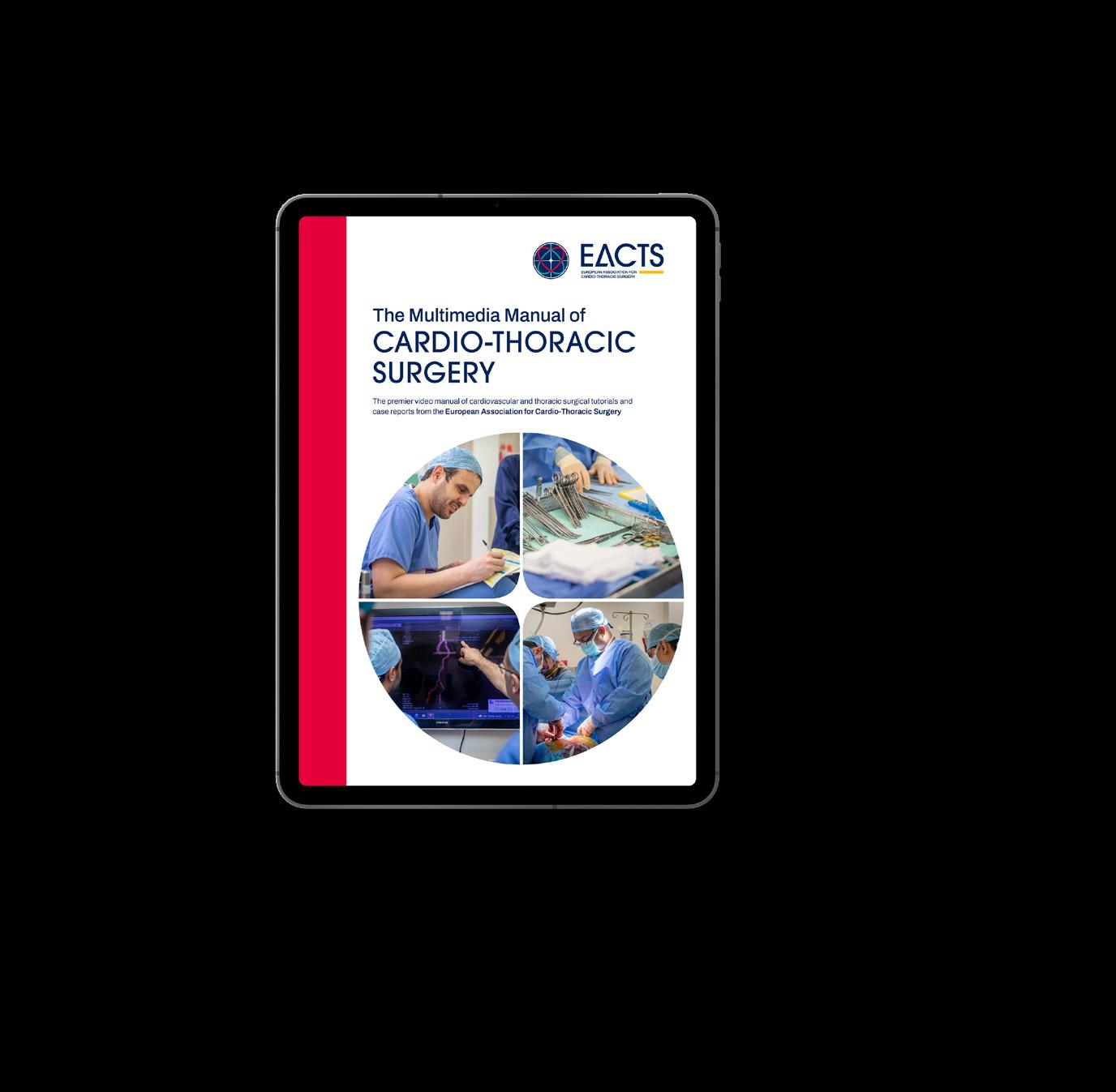
PUBLICATIONS
Our world-renowned, high-quality publications are trusted within the cardiothoracic surgical community for advancing knowledge, disseminating best practice and promoting research excellence.
Editor’s Choice
EJCTS
Comparison between robot- and videoassisted thoracoscopic surgeries for anterior mediastinal lesions
Yeke Huang, Xipeng Wang, Yajie Zhang et al
ICVTS
Latest
EJCTS
articles / videos

2024 EACTS/EACTAIC Guidelines on patient blood management in adult cardiac surgery in collaboration with EBCP
Filip P A Casselman, Marcus D Lance, Aamer Ahmed et al
MMCTS
A challenging case of a giant thymoma resected using the clamshell approach
Giulia Pagliarini, Vincenzo Verzeletti, Alessandro Bonis et al
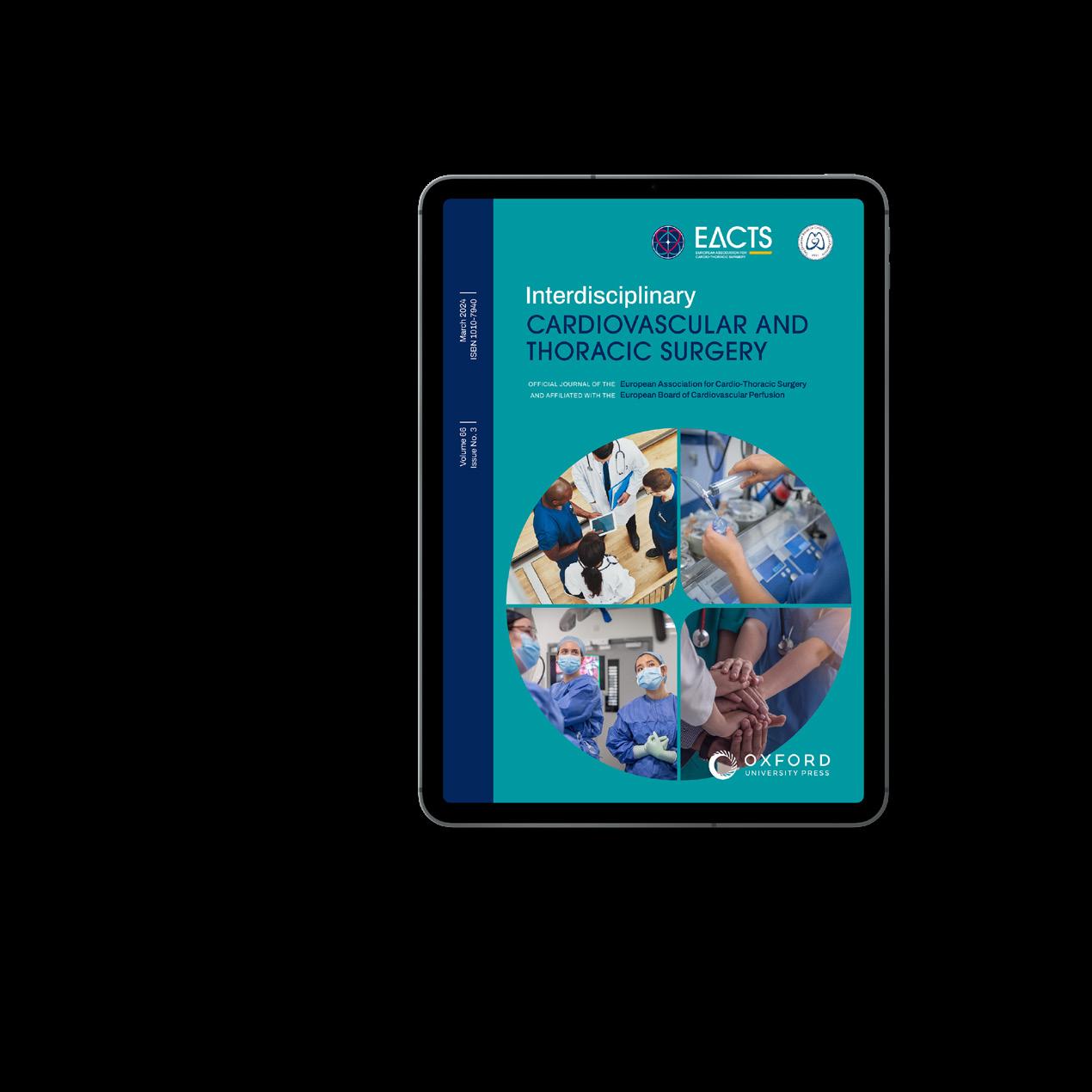
Mechanical bowel preparation versus no bowel preparation for oesophageal cancer surgery: a multicentre, randomized, parallel, open-labelled trial
Yuan Yu, Rui Liang, Yibo Xue et al
ICVTS
Microplastics in cardiopulmonary bypass: quantification and characterisation of particles across systems
Jordan L Green, Daniel T Field, Robert Bennett et al
MMCTS Tutorial
Bicuspid valve-sparing aortic root replacement with the remodelling procedure
Seif Elmankabadi, Patrick Hoang, Elaine E. Tseng et al
MMCTS Case Report
Redo minimally invasive LAA closure with WATCHMAN device
Maris Bartkevics, Fabio Pregaldini, Lorenz Räber et al
2024 reviewers
Thank you to the following colleagues who have voluntarily given their valued time and effort to reviewing papers for both EJCTS and ICVTS in 2024.
Please click on the links below for a full list of reviewers.
EJCTS
https://academic.oup.com/ejcts/article-abstract/67/5/ ezaf097/8129450?redirectedFrom=fulltext
ICVTS
https://academic.oup.com/icvts/article/40/5/ ivaf074/8129086
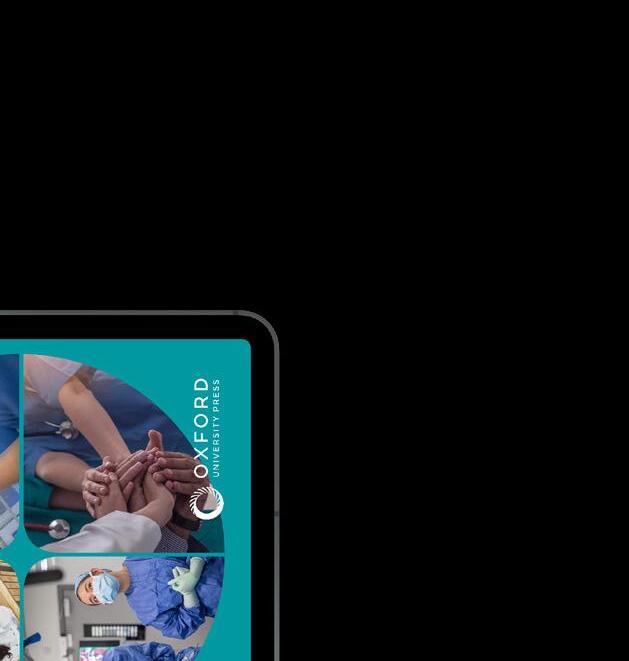
GUIDELINES WEBINARS

Perioperative Medication in Adult Cardiac Surgery
Available on Demand
Catch-up on the latest insights from experts in the field and refine your clinical approach to perioperative medication in this engaging webinar.
Webinar chairs Anders Jeppsson, Bianca Rocca and Cann Gollmann-Tepeköylü delve into evidence-based strategies for perioperative medical treatment and prophylaxis, guided by the latest EACTS Guidelines on Perioperative Medication in Adult Cardiac Surgery. Through real-world case studies, this webinar explores practical approaches to mitigating perioperative risks,
enhancing recovery, and maximising quality of life after cardiac surgery—all while considering the impact on healthcare costs and resource utilisation. Watch now!
Learn more

DISSECTION ROULETTE: HOW TO SURVIVE THE MOST UNFORGIVING SURGERY
June’s episode focuses on the complex management of acute aortic dissection. Our hosts are joined by Florian Schoenhoff and Chris Malaisrie to discuss current strategies in surgical planning and intraoperative decisionmaking. Topics include CT-based assessment, cannulation techniques, malperfusion management, and valve preservation.
The conversation also considers how to optimise outcomes, the role of conservative management in select cases, and the potential future impact of endovascular approaches. Listen for a practical overview of key considerations in this complex procedure.

3RD EACTS AORTIC FORUM
Sharing expertise in aortic pathology


Since its introduction in 2021, the Aortic Forum has evolved to become one of EACTS' most important scientific meetings. Its growing reputation as a mustattend event for those with an interest in aortic pathology has driven registrations from across Europe and beyond, including Australia, South America and Asia.
The 3rd EACTS Aortic Forum took place in June, with over 400 delegates travelling to Prague for a high-quality programme designed to benefit both surgeons and non-surgeons involved in the treatment of aortic disease at all levels. The latest endovascular therapies, type A aortic surgery and valve sparing procedures featured amongst the comprehensive range of topics explored over two and a half days.
Filip Casselman, member of the Aortic Forum Task Force, explained: “This meeting covered all aspects that deal with the aorta, from the aortic valve to the bifurcation in the belly, both from a surgical and an endovascular point of view. The programme was varied; with talks on technical issues but also philosophical discussions, debates and case reports.”
Jan Vojacek, Local Chair of the Aortic Forum Task Force, said: “The Aortic Forum brought together all the recognised experts from this field to one place, sharing their knowledge and

expertise across many different sessions including aortic root surgery, aortic valve sparing procedures as well as dedicated sessions about the Ross procedure and aortic annulus enlargement. Aortic dissection featured prominently as we explored different approaches to treating patients with acute aortic dissection type A including endovascular options.”
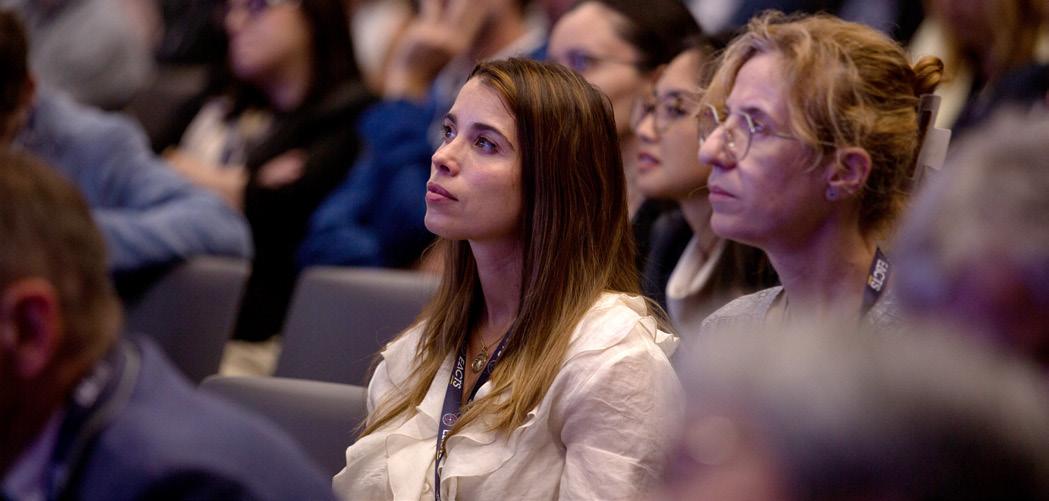
In an interesting session on unseen struggles, experts discussed their failures, which provided a valuable opportunity to learn from these experiences.
In addition to its scientific depth, the programme offered delegates the chance to witness three live surgeries including the David procedure through a minimally invasive approach and replacement of the aortic arch using frozen elephant trunk. Discussing this part of the programme, Jan Vojacek said: “Live surgery is crucial. It is where you get to witness decision-making in real time. For instance, the Ross procedure that was originally planned for live surgery had to be switched to an aortic valve replacement procedure, giving delegates the opportunity to see the factors that influence our decision-making.”
A welcoming environment
The Aortic Forum attracts both established surgeons and surgeons who are new to aortic surgery and building their practice. The welcoming environment of the meeting allows delegates to engage directly with experts and gain insights and tips and tricks to support their daily practice.
Commenting on the lively atmosphere in Prague, Rafael Sádaba, EACTS Vice-President, said: “There’s been lots of interaction and discussion between experts and delegates keen to share their ideas, points of view and knowledge.”
This is reinforced by Ruggero De Paulis, Chair of the Aortic Forum Task Force: “The Aortic Forum is a great chance for people to get together to exchange knowledge and insights into all different kinds of procedures.”
As Jan Vojacek remarked: “The Aortic Forum is special. It’s the second-largest scientific event of its kind - after the EACTS Annual Meeting - and brings together recognised experts from all over the world. There’s a wide variety of opinions, experiences and knowledge shared.”
The Aortic Forum continues to grow in scope and impact. The sessions, debates and live surgeries not only deepen understanding but also help to shape the future of aortic care.


Aortic Forum scholarships
Ten scholarships for the 3rd EACTS Aortic Forum were available to EACTS members, providing an opportunity to learn from the most important and influential voices in the field of aortic surgery. The initiative plays a key role in fostering the next generation of cardiovascular surgeons.
Recipients of the scholarships share their experiences of the 3rd EACTS Aortic Forum
“Meeting, listening and learning from experts has been a great learning opportunity and is something I could not have done without this scholarship.”
Abdussamet Asaroğlu, a fourth-year cardiovascular surgery resident from Turkey
“I'm interested in aortic surgery, and the Aortic Forum is an opportunity to gain more exposure to the field. I feel really fortunate to get the scholarship, which has allowed me to learn how surgeons in different countries operate, gain exposure to different methods and explore the latest cutting-edge research. It’s been really fun.”
Jenna Aziz, an integrated cardiothoracic surgery resident from the Ohio State University
“I knew that I wanted to become a physician from the age of seven, and a cardiac surgeon since I was 12 years old. It was a privilege to attend the Aortic Forum, an experience that was truly transformative.
“As a trainee, gaining access to such an advanced and inspiring environment and learning directly from pioneers in aortic surgery is an extraordinary opportunity. It's not only the hub of scientific excellence, but it's also a place that supports and uplifts the next generation of cardiothoracic surgeons.”
Julia Rogoczewski, medical student from Germany

EACTS ACADEMY
A range of learning and training opportunities are available for all skills levels this September. Developed by experts in their fields, these courses include online learning, available to everyone regardless of location, and in-person programmes offering valuable hands-on experiences.
Webinars
Atrial Fibrillation Webinar I
8 September | Online
The Arrhythmia Task Force is pleased to present the first webinar in the 2025 series dedicated to Atrial Fibrillation.
Be notified when registration opens
Fundamentals in Congenital Heart Disease Webinar 4
10 September | Online

The last in a series of 4 webinars within Fundamentals in Congenital Heart Disease, where our experts will cover 12 modules aligned with EBCTS examinations.
Be notified when registration opens!
Thoracic Webinar: Controversies and new insights in thymic epithelial tumors: from diagnosis to treatment
17 September | Online

Run by the Mediastinal Task Force, the third session of the 2025 Thoracic Disease Domain webinars will look at controversies and new insights in thymic epithelial tumors: from diagnosis to treatment. Proudly in collaboration with International Thymic Malignancy Interest Group (ITMIG).
Register today
Vascular Webinar 3: Cerebral & Visceral Protection
25 September | Online
In the third session of the 2025 Aortic Disease Domain webinar series experts will focus on cerebral and visceral protection.
Be notified when registration opens
In-person courses
Surgical Aspects of Cardiopulmonary Transplantation
18 – 19 September | Newcastle upon Tyne, UK
This popular course is designed to provide cardiothoracic surgeons in training with didactic teaching and hands on cadaveric surgical training experience under the guidance of a faculty of experienced surgeons.
Candidates will also implant left ventricular assist devices, practice cannulation for ECMO and gain practical experience of ex vivo lung perfusion. This is an intensive two-day course of lectures, debate and practical hands-on surgical practice and opportunity with a very high ratio of faculty to delegates and outstanding feedback from those attending each year.
Register today
Aortic Valve Repair and Ross Operation
18 – 19 September | Brussels, Belgium
This two-day course is designed to provide all aspects of the Brussels School approach and techniques on aortic valve reconstructive surgery and Ross operation.
This year, we will focus on new available techniques to optimise immediate surgical results and long term durability of AV repair and Ross procedure.
The programme includes
• Case base discussion on particular or difficult situations
• Didactic presentations, videos and live surgery detailing surgical techniques such as valve sparing reimplantation, annuloplasty and cusp repair
• Ross operation and the different options of autograft reinforcement
The course takes place in a relaxed and interactive atmosphere surrounded by an experienced team and distinguished guests’ faculty.
Register today
HIGH-QUALITY LEARNING, DISCUSSIONS AND INTERACTION
The 9th EACTS MCS Summit I 20-22 November 2025
From experts in the field or a relative newcomer to Mechanical Circulatory Support (MCS), Gloria Färber, one of the Chairs of the 9th EACTS
Mechanical Circulatory Support (MCS) Summit, explains why this year’s meeting is not to be missed.
With a packed programme covering the whole spectrum of aspects of acute and chronic heart failure, from patients selection for different treatment modalities to treatment strategies, the MCS Summit in November is relevant for anyone who takes care of patients with terminal heart failure.
Join our international faculty to discuss newly released EACTS/STS/AATS guidelines for temporary MCS, an update on current ongoing trials and an opportunity to discuss innovation in MCS therapy.
As well as the latest technical devices we will also explore improvements in treatment strategies. AI is a future key player in our private and professional life with great potential to improve patient care. On the first day of the Summit, we will explore and critically discuss the use of AI for patient screening and creating big data to optimise treatment.
An open and friendly format
Highly experienced heart failure cardiologists and surgeons from around the world will share their tips and tricks as they present their creative solutions to common problems and unique situations which present a challenge in our daily practice. It is always interesting to see how other groups solve a problem. In one of the final sessions, ‘Beauty and the Beast’ leading heart failure specialists including cardiologists and cardiac surgeons will discuss how they have treated complex cases.
The MCS Summit is an interactive meeting and sessions such as Saturday’s pro and cons debate is a chance for delegates to join discussions as we consider different treatment strategies.
The poster session offers newcomers to the field a relaxing and supportive environment to present their work on terminal heart failure and MCS. It is an exciting opportunity to connect with other centres and have a friendly exchange.
The Rising Stars quiz
We have a very busy programme over two and a half days, but we are also dedicated to making the Summit an enjoyable experience. The Rising Stars quiz is always a highlight of the meeting, and I encourage hospitals to send a team. The quiz is a test of knowledge with some surprise questions. There’s also a fantastic prize of free registration for the 40th EACTS Annual Meeting.
This is a meeting not only for experts in the field but also for those who are relatively new to MCS and want to make improvements in their daily practice. The MCS Summit offers high-quality learning in a relaxed environment so do not miss out – register today!
Find out more and register
We will explore and critically discuss the use of AI for patient screening and creating big data to optimise treatment.
UPCOMING COURSES 2025


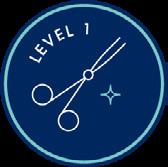






Examination success
The first Unified European Board of Thoracic Surgery Examination (Level 2 Fellowship) took place at the ESTS Annual Meeting in late May with 75% of candidates from across Europe achieving the Fellowship qualification.
During the 90-minute examination candidates were tested on their knowledge, interpretation of investigations and imaging, patient management and clinical judgement themed to coincide with major areas of practice.
Recently launched, the Unified European Board of Thoracic Surgery (UEBTS) examinations which comprise both Membership and Fellowship assessments represent an essential qualification that sets a new standard for excellence in thoracic surgery across Europe and beyond. This is a collaborative initiative led by EACTS, the European Union of Medical Specialists (UEMS) and the European Society of Thoracic Surgeons (ESTS).
Stephen Clark, Chairman of the European Board of Cardiothoracic Surgery (EBCTS), said: “The examination was the successful culmination of two years' work to blend the EBTS/UEMS and EBCTS examinations in thoracic surgery into one assessment for surgeons training in Europe. Feedback was excellent, with all candidates noting that they were treated with respect and fairness by the examiners and that the assessment was very much like a discussion of patient management with their peers and colleagues. I am delighted that the new examination was met so favourably on this historic day.”
Thirteen examiners from both EBCTS and EBTS took part, representing 11 countries with formal quality assurance in place throughout the examination.
NEW WEBSITE
Visit the new website for the European Board of Cardiothoracic Surgery (EBCTS) for more information about the exams set by the global examination board for cardiothoracic surgery.
EBCTSEuropean Board of Cardiothoracic Surgery

The UEBTS Level 1 (Membership) exam
Forty candidates have already registered for the Level 1 (Membership) examination on 16th September. Held in test centres around the world, this quality assured examination consists of a four-hour, 180 multiple choice question paper.
Learn more about the Level 1 exam
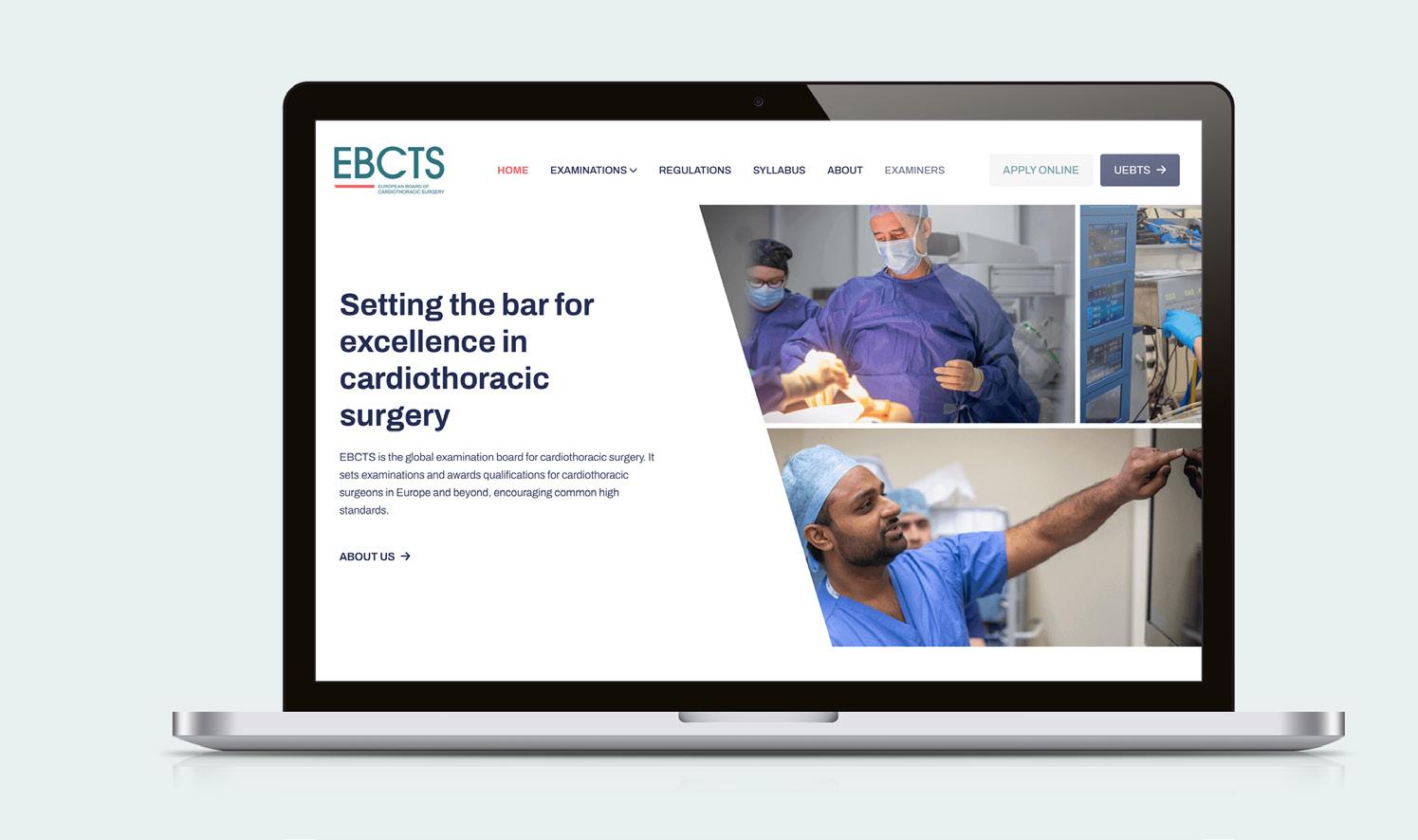
SOARING TO NEW HEIGHTS
Apply for a Francis Fontan Fund Fellowship
Applications for EACTS Fellowships across the thoracic disease and congenital heart disease specialties are open. Available to EACTS members, these fellowships offer unique opportunities to expand theoretical and practical skills, and gain experience in techniques such as minimally invasive approaches, robotic thoracic surgery and the Ross procedure.
Also open for applications will be the popular collaborations fellowships. These include the international travelling fellowships and the quality & outcomes fellowship, which offers a unique, career-enhancing training opportunity with one of the world’s leading quality improvement teams.
Thoracic Disease Fellowships
VATS Fellowship in General Thoracic Surgery
The VATS Fellowship in General Thoracic Surgery is an opportunity to receive appropriate training in VATS. This includes gaining all the necessary knowledge and competences to perform VATS lobectomies safely. This fellowship enables the successful fellows to compile the necessary training in all aspects of lung cancer surgery to be able to achieve the European Board of Cardiothoracic Surgery (Membership and General Thoracic subspecialty) during or after completion of the fellowship.
Thoracic & Minimally Invasive Surgery Fellowship
This fellowship provides an unprecedented opportunity for less experienced thoracic surgeons to improve their understanding of diagnosis and treatment in thoracic oncology and master state-of-the-art skills in surgical management focusing on minimally invasive approaches.
These prestigious fellowships offer a ‘once-in-a-lifetime’ experience to work alongside experts in their field in some of the most renowned centres in the world. The Francis Fontan Fund Fellowship Programme has grown at a phenomenal rate over the past few years, with more fellowships on offer to EACTS members and applications at an all-time high.
The first phase of applications across acquired cardiac disease and other initiatives received over 170 applications: a considerable increase from past years. A clear demonstration of the value and significance of the fellowship programme across the cardiothoracic community.
Please see below the full list of fellowships across congenital heart disease, thoracic disease and collaborations.
Robotic Thoracic Surgery Fellowship
Advance technical skills and accuracy in robotic thoracic surgery and gain in-depth understanding of thoracic surgical outcomes with one of the world’s leading quality improvement teams. The successful fellow will be provided with a unique opportunity to visit medical research and advanced robotic technological institutes in Europe.
Read Kristiina Pälve’s experience opposite.
These prestigious fellowships offer a ‘once-in-a-lifetime’ experience to work alongside experts in their field in some of the most renowned centres in the world.

Thoracic Surgery Foundation & Francis Fontan Fund International Travelling Fellowship in Partnership with The Latin American Association of Cardiac and Endovascular Surgery
Following the success of the Thoracic Surgery Foundation & Francis Fontan Fund International Travelling Fellowship, EACTS and TSF have expanded to partner with the Latin American Association of Cardiac and Endovascular Surgery (LACES).
Thoracic Surgery Foundation & Francis Fontan Fund International Travelling Fellowship
The International Travelling Fellowship – a collaboration between EACTS and TSF – fosters the continued growth and development of cardiothoracic surgeons by providing opportunities to learn from the highest standards of cardiothoracic care and gain knowledge of novel techniques and innovative technologies used by other institutes around the world.
Congenital Heart Disease Fellowships
Adult Congenital Heart Disease Fellowship
The fellowship offers an opportunity to obtain both theoretical and practical skills within the full spectrum of adult congenital heart disease, including all treatment modalities for congenital aortic stenosis, aortic insufficiency and (neo-) aortic root aneurysm.
A GAME-CHANGING EXPERIENCE

Kristiina Pälve, a cardiothoracic surgeon at Turku University Hospital in Finland discusses her experience of the Robotic Thoracic Surgery Fellowship.
I am a cardiothoracic surgeon working at a small university hospital. My colleagues and I started the robotic programme in December 2022, but thoracic surgery remains a small part of our work. We perform about 30 to 50 lobectomies per year.
Quality and Outcomes with MSTCVS Fellowship
In conjunction with the Michigan Society of Thoracic and Cardiovascular Surgeons (MSTCVS), gain an in-depth understanding of cardiothoracic surgical outcomes working alongside the world’s leading quality improvement teams.
Pragmatic Clinical Trials Fellowship in partnership with Weill Cornell Medicine
The recipient of this fellowship will gain an in-depth understanding of cardiothoracic pragmatic clinical trials design and implementation with one of the world’s leading cardiac surgery clinical trials unit. In addition the recipient will obtain a Masters degree in Clinical Epidemiology at Weill Cornell Medicine.
The possible introduction of a Lung Cancer Screening Programme in Finland would likely lead to an increase in patients with smaller nodules who require a segmentectomy. This is not a procedure that we perform in my unit, and the Robotic Thoracic Surgery Fellowship offered an excellent opportunity to gain experience of segmentectomies, working alongside experts in the field.
I spent three weeks in Paris at the Hôpital Privé d’Antony alongside the Head of Thoracic Surgery, Marion Durand. During this time, I saw one lobectomy and the remainder of operations were segmentectomies. It was incredibly useful to see how a specialist performs this procedure and be able to ask questions directly rather than learning through books and watching some videos. Everything I learnt throughout this experience I have shared with colleagues.
To date, the fellowship has exceeded my expectations. It has been a highly educational and enjoyable experience that will have a long-lasting impact. We will continue to benefit from the expertise and guidance of Marion Durand via telesurgery to discuss difficult patient cases. This experience has been a game changer for my unit and for patients in my region.
DESIGNING THE FUTURE INNOVATE, DISCOVER, EDUCATE
THE 39TH EACTS ANNUAL MEETING 8 - 11 October 2025 • Copenhagen, Denmark
Join us in Copenhagen for the 39th EACTS Annual Meeting. For 2025 you can expect robust debate and discussion led by global experts, the latest technological advances on display and an opportunity to share knowledge and socialise with your peers from around the world.
